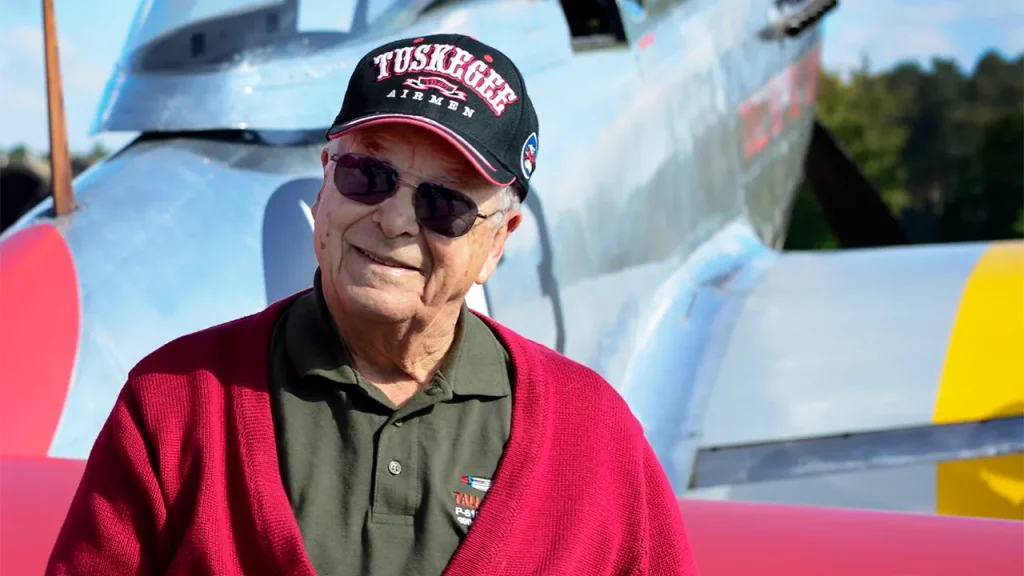A Legacy of Courage: Remembering Lt. Col. George Hardy, Tuskegee Airman
Lt. Col. George Hardy, one of the last surviving members of the legendary Tuskegee Airmen, has passed away at 100 years old, leaving behind an extraordinary legacy of courage, resilience, and triumph over adversity. At just 19, Hardy became the youngest Red Tail fighter pilot to fly his first combat mission over Europe during World War II, representing a groundbreaking unit of America’s first Black military pilots. His story is not merely one of military achievement but symbolizes the determination of those who excelled despite facing systemic racism and prejudice. Hardy’s passing leaves only 13 Documented Original Tuskegee Airmen alive today, marking the fading of a generation whose contributions forever changed American military history and civil rights.
Born in Philadelphia in 1925 as the second of seven children, Hardy’s life took a decisive turn on December 7, 1941. While doing homework upstairs, he was interrupted with news of the Pearl Harbor attack—a moment that would eventually lead him to military service. By 1944, he had entered the U.S. Army Air Forces and trained at Tuskegee Army Air Field, earning his commission as a Second Lieutenant. His deployment to Italy in early 1945 with the African American 99th Fighter Squadron, 332nd Fighter Group marked the beginning of an impressive combat career. Based at Ramitelli Air Field, Hardy completed 21 missions over Germany and occupied Europe, piloting the iconic P-51 Mustang aircraft—the “Red Tails” whose distinctive paint schemes became symbols of excellence and precision.
Hardy’s military service spans three major American conflicts, demonstrating remarkable versatility and commitment across decades of changing warfare. After his World War II service, he flew 45 missions during the Korean War and an additional 70 missions in Vietnam—an astonishing total that few American pilots can claim. This remarkable combat record across three wars represents not just personal courage but a persistent dedication to service despite a military and society that did not always welcome or appreciate Black servicemembers. Throughout these conflicts, Hardy continued to prove what the Tuskegee Airmen had set out to demonstrate: that Black pilots could perform with the same skill, courage, and effectiveness as anyone else in the armed forces.
Following his active combat years, Hardy continued to serve his country through education and technological innovation. He earned degrees at the Air Force Institute of Technology, applying his intelligence and determination to new challenges. His technical expertise contributed significantly to the development of the Department of Defense’s first global military telephone system—a vital communications network that transformed military operations worldwide. After retiring as a lieutenant colonel in 1971, Hardy could have quietly enjoyed his well-earned retirement. Instead, he embarked on perhaps his most important mission: becoming a passionate advocate for preserving and sharing the Tuskegee Airmen’s story with future generations.
Understanding the historical significance of the Tuskegee Airmen’s achievements, Hardy dedicated much of his later life to educational outreach, speaking to students across the nation about this critical chapter in American history. His efforts helped ensure that the story of the Tuskegee Airmen—their struggles, their excellence, and their impact on military integration—would not be forgotten. The importance of their legacy received formal recognition when the Tuskegee Airmen were collectively awarded the Congressional Gold Medal in 2007, and more recently, the National WWII Museum’s American Spirit Award in 2024. When accepting this honor on behalf of his fellow airmen, Hardy humbly reflected, “When I think about the fellas who flew before me and with me at Tuskegee, and the fact that we did prove that we could do anything that anyone else could do, and it’s paid off today… it’s hard to believe that I’m here receiving this award—with them.”
The passing of Lt. Col. George Hardy represents more than the loss of an individual hero; it marks the continuing transition of the Tuskegee Airmen’s story from living memory to historical legacy. The Tuskegee Airmen, Inc. National Office captured this sentiment in their tribute: “His legacy is one of courage, resilience, tremendous skill and dogged perseverance against racism, prejudice and other evils. We are forever grateful for his sacrifice and will hold dear to his memory.” Hardy’s life spanned a century of profound change in American society, and he was both witness to and agent of that transformation. From a young man facing segregation and limited opportunities to a decorated officer whose achievements helped open doors for future generations, George Hardy’s journey embodies the progress made and the continuing work needed to fulfill America’s promise of equality. As we remember his remarkable life, we honor not just his individual courage but the collective impact of the Tuskegee Airmen who proved, through excellence and determination, that skill and character know no color.


